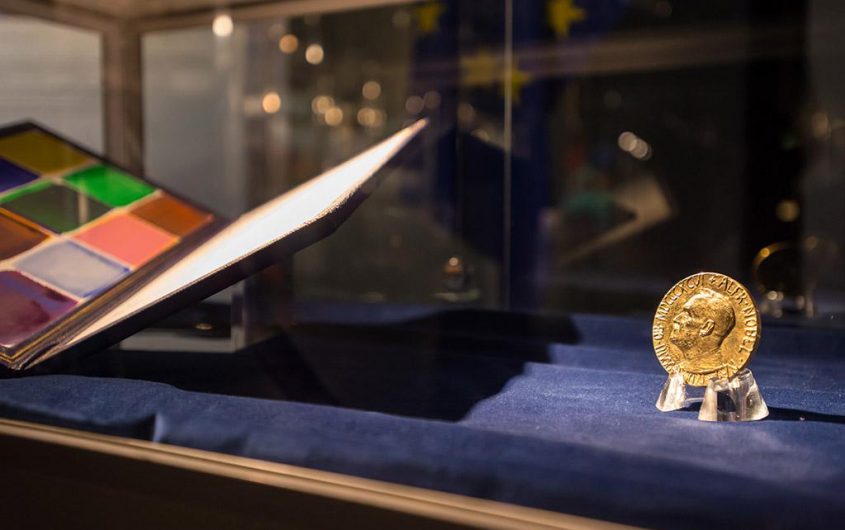
European Parliament via Flickr
The Ukrainian People Deserve the Nobel Peace Prize

Eckhard Lübkemeier
German Institute for International and Security Affairs (SWP)
Eckhard Lübkemeier, Ambassador (ret.), is a Visiting Fellow at the German Institute for International and Security Affairs (SWP), Berlin.

Klaus-Dieter Frankenberger
Non-Resident Senior Fellow
Klaus-Dieter Frankenberger is non-Resident Senior Fellow at AICGS.
An earlier version of this Op-Ed was originally published in German in the Neue Zürcher Zeitung on April 28, 2023.
When wars erupt, it is not always possible to clearly differentiate between aggressor and victim. In Ukraine, however, it is obvious: Putin’s Russia is the aggressor and sole culprit. This is true even if “the West” is accused of provoking Putin by expanding NATO eastward and holding out the prospect of membership to Ukraine. Ukraine did not attack Russia; Russia invaded Ukraine, and it did so long before February 2022 by infiltrating the Donbas region.
Russia has breached the peace, while Ukraine is defending itself—massively supported by Western countries and based on international law and the United Nations Charter. The party under attack not only has the right to respond by using counterforce; it has no other choice if the aggressor is bent on annihilation.
President Volodymyr Zelenskyy and the people of Ukraine will be awarded the 2023 Charlemagne Prize on May 14 in the German city of Aachen because, in the words of the selection committee, “the Ukrainian people deserve the greatest recognition for the way they are defending freedom, democracy and self-determination.” One could go a step further: the Ukrainian people are fighting not only for freedom from subjugation, but also for peace. They deserve not only the honor they will receive in Aachen, but also the world’s most prestigious recognition: the Nobel Peace Prize.
Now, at the latest, is the time to recognize that creating a “more peaceful world” by armed resistance can be necessary and legitimate—if and when, as in Putin’s war, there is no doubt who is the aggressor and who is the victim.
Awarding the Nobel Peace Prize for waging a war, albeit a defensive one? For the Oslo-based Committee deciding the prize, it would amount to a radical departure from its practice hitherto. For this to happen, it would have to be compatible with Alfred Nobel’s will. In it, the founder of the prize stipulated in 1895 that it should go to “the person who shall have done the most or the best work for fraternity between nations, the abolition or reduction of standing armies, and for the holding or promotion of peace congresses” and who has thus “rendered the greatest benefit to mankind in the past year.”
Over the decades, the Oslo Committee has adapted this stipulation to changing times and circumstances. In its own words, since World War II, the Peace Prize has principally been awarded to honor efforts in four main areas: arms control and disarmament, peace negotiation, democracy and human rights, and work aimed at creating a better organized and more peaceful world.
Now, at the latest, is the time to recognize that creating a “more peaceful world” by armed resistance can be necessary and legitimate—if and when, as in Putin’s war, there is no doubt who is the aggressor and who is the victim. In endowing the prize, Alfred Nobel intended to promote the “fraternity of nations” and to further work towards “peace congresses.” Putin’s goal of “denazification” is nothing but destruction and annihilation. Only history can tell whether a Ukrainian-Russian relationship that goes beyond hostile co-existence can ever be achieved once the war will have ended. Surely, however, the prerequisite for a peace based not only on an armed standoff but a modicum of cooperation can only materialize if Ukraine prevails and Russia fails. As it stands, this can only be achieved by defeating Russia on the battlefield.
Peace is more than weapons being silent. A peace that does not carry the seeds of the next armed conflict requires mutual trust, constantly renewed by words and, above all, by deeds. Within the European Union, which is nothing less than a peace community, this trust goes so far as rendering armed forces obsolete: if only the EU existed, its members could disarm completely since they trust each other to settle their conflicts without the threat or use of force. For this historically unprecedented achievement of “fraternization,” the EU was awarded the Nobel Peace Prize in 2012.
In a fragmented world, the EU is still the exception. Where not enough trust exists to forge a stable peace community, reassurance through armed deterrence remains necessary. If this does not inhibit an aggressor from waging war, the only option to thwart him is to fight back, military means included.
Unless, of course, the attacked party would surrender. But this would entail submission and reward the aggressor. Moreover, it would not even be a “peace diktat,” since nurturing peace by extortion is a contradiction in terms. It is true that peace begins with weapons turning silent, and for that, even in the case of the Ukrainian war, negotiations or, in the words of Alfred Nobel, a “peace congress” will be needed at some point. But for Ukraine, such a congress can only deliver national self-determination and thus a sustainable peace if it succeeds in making Putin and his regime realize that further aggression would come at too high a cost and risk.
Hence, the time has come to “nobilize” peace-making by the use of counterforce. Alfred Nobel may not have had this in mind when he endowed the Nobel Peace Prize. But it does not contradict his intention to honor a sincere commitment to fraternization and thus a lasting peace. On the contrary, an international order that nurtures peace through the rule of law and mutually-agreed norms that, like the United Nations Charter, have universal range—such order cannot thrive if might is allowed to trump right and those who harbor imperialist ambitions can commit acts of terror with impunity.
To award the Nobel Peace Prize to the people of Ukraine for exercising their right to self-determination would honor their bravery and reinforce their determination to repel the aggressor. It would encourage Ukraine’s Western supporters to not cut back their assistance. It would stigmatize Russia and other potential aggressors. Above all, it would send a powerful message: a peace resting on the rule of law must be defended—with arms if necessary.








